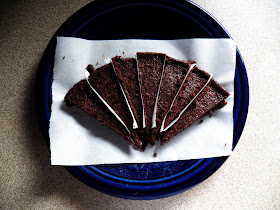I have a terrible confession. I cannot grow zucchini. This would be bad enough if I did not consider myself a gardener. Because we all know that apes, if given zucchini seeds, will be able to throw them on the ground and successfully grow zucchini. The fact that I do consider myself a gardener (albeit not a long time vet) makes it all the more shameful. I'm not sure what my problem is. Bugs? Heat? Bad karma from a previous life in which I was a really cocky beefsteak tomato? I'm not sure. Whatever the case, every year I faithfully plant my little zucchini and crookneck squash seeds. And every year several plants grow up and flower and look healthy and flower some more and house bees and flower more and maybe produce an inch-long zucchini that then withers and flower some more. Clearly, what I really need to learn to do is stuff and fry up those flowers (take that, male zucchini flowers), but I'm guessing there would be one and only one person in this household willing to try such a delicacy so I'd still sort of have my problem.
The good news is that plenty of other people (and most likely several species of lower-level primates as well) do not have my problem. Thus, even though I seem completely incapable of producing a lovely (or even ugly) zucchini, I am the happy receptacle of other peoples' too-much-zucchini problem.
Last week I got a bunch. I was supposed to give some to my friend Emilee who was at my house, but I forgot (sorry, Emilee), which left me with a lot of zucchini and yellow squash. Not those delicate little 4-inch beauties you find at the supermarket either. Nope. These were the summer-is-on, foot-long-and-fat kind of zucchini.
I shredded and froze some. I made zucchini bread. I made a squash casserole. But.it.was.still.there. So I took drastic measures and made this soup. It's nice because it uses a whole lot of zucchini and doesn't even have to stuff that zucchini with cheese, bread crumbs, and butter.
The recipe I give you is a bit of a blank slate. It is pretty good on its own. But it is much much better with your favorite seasoning thrown in. My favorite is dill (which I, happily, am able to grow by the booty-full). I also really like cumin or curry. I also really like these seasonings in combination (i.e. cumin and dill--yum). I've also heard that a good sprinkle of Italian seasoning won't do you wrong, but I haven't tried it yet. I actually leave the soup plain and then each day when I have a bowlful, I add a sprinkle of whatever seasoning I'm in the mood for that day. What can I say? I live an exciting life.
This soup also freezes well. So if you get a little souped out, you can freeze a batch and pull it out in a few months when temperatures are drifting down and you get a wee hankering for a bit of summer combined with a breezy fall day.
Zucchini Soup
serves 4-8
Prep time: 5 minutes
Cook time: 30 minutes
Cost: $.45
onion: .15, zucchini: free, broth: free if you made it yourself; otherwise about .30 from granules
Note: If you've got one of those enormous zucchini, cut it in quarters long-ways and scoop or cut out the seeds.
Another note: I say 4 C in this recipe. That's kind of an estimate. You can probably get away with 4-6 cups. The original recipe called for 4 four-inch zucchini.
1 generous Tbsp olive oil
1 onion, chopped
4 C zucchini
salt and pepper
4 C chicken broth
Heat oil in a pot. Add onion and stir for a couple of minutes. Add zucchini and stir. Sprinkle with salt and pepper. Let zucchini cook with onion until they're both tender and (hopefully) getting a little color. (Note: If you jam your pot full like I sometimes do, you won't get much color--that's okay too, but the brown bits do add some nice flavor.)
Add broth, bring to boil, then reduce heat and simmer covered for 20 minutes or until vegetables are very very soft.
Puree in blender or with an immersion blender (don't burn yourself, eh).
Reheat if necessary. Serve with dill, cumin, curry, or Italian seasoning. If using fresh herbs, give them a squeeze with your hand to release some of their oils and then let them steep in the warm soup for a few minutes. (Note: I love this with fresh dill, but don't do what I did in the picture up top. It's pretty, but it's like eating hair. Either leave the dill attached to its stalk so you can remove it before eating or eat around it, or chop it finely.)



































